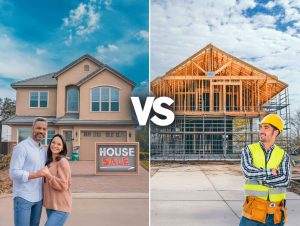Canada’s housing market boasts a wide array of home styles, each offering unique features to suit different lifestyles and budgets. From the urban condominiums to suburban detached houses, the choices are vast and varied, including condominiums, apartments, townhouses, detached houses, bungalows, split-level homes, duplexes, triplexes, fourplexes, and semi-detached homes. Understanding each type’s characteristics, advantages, and disadvantages is crucial in making an informed decision in the diverse Canadian real estate landscape.
Condominiums
Condominiums, or condos, are individual units within larger buildings, commonly found in urban areas and offering shared amenities. They are ideal for those seeking a community living experience combined with the convenience of low maintenance.
Advantages: Low maintenance, security, and access to shared amenities like gyms and pools.
Disadvantages: Less privacy, condo fees, and potential for noise from neighbors.
Apartments
Apartments are rental units within residential buildings, ranging from studios to larger multi-bedroom configurations, often located in central urban areas.
Advantages: Flexibility in leasing, no maintenance responsibilities, and central locations.
Disadvantages: Restrictions on customization, variable rent prices, and potential for less space.
Townhouses
Townhouses, offering a balance between condos and detached homes, are multi-floor homes that share walls with adjacent properties and often come with their own private entrances.
Advantages: More space than condos, private entrances, and some outdoor space.
Disadvantages: Limited privacy compared to detached homes, homeowners association fees.
Detached Houses
Detached houses are standalone homes, offering maximum privacy and space, often featuring front and back yards, appealing to those seeking independent living with ample space.
Advantages: Privacy, potential for larger living space, and own outdoor area.
Disadvantages: Higher maintenance responsibilities, generally more expensive.
Bungalows
Bungalows are single-story homes, often accompanied by a basement, known for their easy accessibility and prevalent in established neighborhoods.
Advantages: Accessibility, easier maintenance, and presence in established neighborhoods.
Disadvantages: Less living space on the main floor, potential for higher costs in older homes.
Split-Level Homes
Split-level homes feature staggered floors connected by short staircases, offering separation of living spaces while maintaining an open and inviting feel.
Advantages: Separation of living spaces, open concept design.
Disadvantages: Multiple stairs can be inconvenient, challenges in renovation.
Duplexes
Duplexes are single buildings divided into two separate living units, each with its own entrance, often chosen for their balance of privacy and potential rental income.
Advantages: Potential for rental income, more affordable than a detached home.
Disadvantages: Shared building responsibilities, less privacy than a detached home.
Triplexes and Fourplexes
These buildings, divided into three or four separate units, are an attractive option for those looking for income-generating properties or an affordable entry into homeownership.
Advantages: Income generation from multiple units, affordable entry into homeownership.
Disadvantages: Responsibility for tenants, shared maintenance.
Semi-Detached Homes
Semi-detached homes, attached to one other home on one side, offer a blend of shared and independent living, often found in desirable neighborhoods.
Advantages: More affordable than detached homes, often located in desirable areas.
Disadvantages: Less privacy than detached homes, potential for noise from the attached unit.
Price Range
Condos and apartments generally offer more affordable options, while detached houses are at the higher end of the spectrum, especially in sought-after areas. Townhouses, duplexes, triplexes, and fourplexes present a mid-range pricing, offering a balance between affordability and space. Bungalows and split-level homes’ prices can vary greatly depending on location and age.
Each housing type in Canada provides distinct benefits and challenges, making it important to consider personal circumstances and preferences when navigating the varied real estate market.






